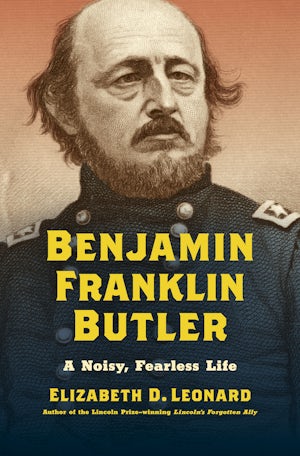
This book by Professor Elizabeth Leonard is a sympathetic portrait of Major General Benjamin Butler. No, it doesn’t attempt to paint him as a military genius. Professor Leonard does make criticisms where she feels they are warranted, but she also dispels lost cause mischaracterizations of Butler and his actions.
As Professor Leonard herself puts it, the book “is a depiction of Butler as [she reads] him: a brilliant, complicated, funny, annoying, loving, beloved, frequently brash individual who was unquestionably ambitious and could be opportunistic, but who also exhibited a rather stunning capacity for ideological growth and development and an impressive and genuine dedication to bringing about the kind of social and cultural transformation so many Americans still seek today. Butler’s life span–1818-1893–coincided with the rise and much contested consolidation of American industrial capitalism and the beginning of the Gilded Age, the birth and advancement of the movement for women’s rights as well as the expansion of the electorate to include landless White men, massive waves of both immigration and anti-immigrant nativism the fierce political struggle over slavery that gave way to America’s brutal Civil War, Emancipation, and the expansion, at least fleetingly, of African Americans’ civil and political rights during Reconstruction, as well as the violent reemergence of white nationalism with all of its anti-egalitarian, antidemocratic consequences.” [p. xviii]
With the book organized in the chronological order of Butler’s life, Leonard argues for a nuanced view of Butler and his military abilities. “In the end, like virtually every other Civil War military leader, including those trained at West Point, Butler stumbled on the battlefield more often than he liked to admit, which his opponents during his life and after took great pleasure in highlighting. Equally true, however, is that Butler sacrificed boldly and generously for the nation’s cause throughout the war and accomplished much while he was in uniform that was to the country’s, and not least African Americans’, benefit.” [p. 54]
One issue with which Butler made a huge impact during the war is the issue of those escaping enslavement. It happened when he was in command of Fortress Monroe at the tip of the York/James Peninsula in Virginia. “Soon, however, Butler had a more immediate and ultimately consequential problem to solve at his new headquarters: what to do about the arrival at the fort of three bondsmen–Frank Baker, Sheppard Mallory, and James Townsend–whose rebel owner, Col. Charles K. Mallory, had impressed them into service constructing a battery across Hampton Roads at a place called Sewall’s Point. The three men had bravely escaped by boat and, having surrendered to the pickets at Fort Monroe, now requested federal protection. Initially, Butler ordered Baker, Mallory, and Townsend ‘fed and set to work’ while he considered his options. Then, when Colonel Mallory’s emissary, Maj. John B .Cary, appeared at the fort on May 24 to retrieve the men, Butler resolutely declined to hand them over. … his sharp legal mind slowly reasoning its way to the position that Virginia’s recent claim of independence from the United States meant that escapees from bondage there–unlike, for example, in still-loyal Maryland–were no longer subject to the US Fugitive Slave Law. Moreover, in Virginia and throughout the self-declared Confederacy–again in contrast with the case for the loyal slave states–US authorities no longer had an obligation to lift a hand to suppress a rebellion by the enslaved. ‘I am under no constitutional obligations to a foreign country, which Virginia now claims to be,’ Butler recalled informing Cary, though he offered to return Colonel Mallory’s human property if the colonel would simply come to the fort and swear an oath of allegiance to the United States. Looking back, Butler later explained, ‘I do not claim for the phrase ‘contraband of war,’ used in this connection, the highest legal sanction,’ and ‘the truth is, as a lawyer I was never very proud of it.’ However, ‘as a executive officer’ in the volunteer army of the United States, committed to saving the Union, ‘I was very much comforted with it as a means of doing my duty.’ ” [p. 66]
Butler’s time in New Orleans added to the controversy about him. One of his early concerns was to avert the yearly Yellow Fever outbreak. “In Butler’s view, there were two keys to preventing an outbreak. First, he must develop effective quarantine processes for outsiders entering the region, particularly from the Gulf. … Second, as he had done on Ship Island, he must act quickly to improve the city’s sanitation infrastructure.” [p. 88] You won’t hear this from neoconfederates, but Butler’s time in New Orleans was marked by help for the region’s poor. “In early June, Butler had also begun taking steps to combine his commitment to feeding the poor, his determination to prevent a yellow fever outbreak, and his desire to punish the wealthy local Confederate leaders: he put thousands of needy residents, Black and White, to work on sanitation duty cleaning the city’s streets and sewers and performing other tasks, like repairing levees, and paying them with the taxes he collected from the rich. Further, he demanded that property owners ‘clean up their grounds’ (or pay workers to have it done), promising to arrest those who refused. In the end, Butler’s efforts to stave off both yellow fever and mass starvation at the expense of the city’s financial and political elite were successful, although they predictably infuriated the local elites who could not even bring themselves, in most cases, to admit the salubrious effects of his innovative policies.” [p. 89]
Something else for which Butler’s time in New Orleans is known is his organizing and equipping Black soldiers. “The Native Guards regiments Butler reclaimed for US Army service originally comprised approximately 1,400 free Blacks, many of whose ancestors ‘had fought alongside Andrew Jackson in the Battle of New Orleans in 1815,’ who had responded–‘albeit halfheartedly,’ writes one historian–to the Confederate government’s summons to defend Louisiana against Federal invasion. Once the Federals occupied the city, however, these same men [though not all of them] readily answered Butler’s call to serve the Union, a call he sweetened by declaring his willingness to accept their Black officers as well. By the end of November 1862, and while ‘specific approval’ was still pending from the War Department, Butler had taken command of three such regiments, the First, Second, and Third Native Guards, now comprising about 3,000 men and including hundreds of runaway bondsmen.” [p. 107]
Butler also instituted a program to put poor people to work earning money. “Butler’s Special Orders No. 441 began by observing that Confederate owners of some local sugar plantations had abandoned their land, and that the crops were now in danger of ‘running to waste.’ Should that happen, the profits the sugar could produce ‘will be lost as well to the late owner as to the United States.’ Noting the increasing number of runaways from slavery whose labor could and should be harnessed, he therefore appointed a man named Charles Weed to ‘take charge of said plantations, and such others as may be abandoned along the River between the city and Fort Jackson, and gather and make these crops for the benefit of the United States, keeping an exact and accurate account of the expenses of each.’ Butler charged Weed with hiring Black laborers first, in consultation with ‘the several Commanders of Camps for laborers.’ In such case as the number of available Black laborers proved insufficient for the task, he authorized Weed to employ White laborers ‘at $1.00 per day for each ten hours of labor.’ ” [p. 109]
Dr. Leonard doesn’t shy away from charges of corruption, noting there is no hard evidence linking Butler to any corruption, and his issuing of the so-called “Women’s Order,” which worked in curbing women of New Orleans from disrespecting United States troops and officers and acting in a decidedly “unladylike” manner. In assessing Butler’s performance in New Orleans, Leonard writes, “As another historian observes, Butler ‘gave New Orleans the most efficient and healthful administration it had ever known. He cleaned up the foul sewers, established new drainage systems and health regulations and embarked on an ambitious public works program that provided jobs for the poor and the unemployed,’ even if it meant confiscating public and private Confederate property to fund it. And he revived the local economy in the process. There is no question that Butler took considerable satisfaction from explicitly positioning himself as something of a Robin Hood figure in New Orleans. He cheerfully and without remorse commandeered resources (including confiscated property, taxes, and the like) from the wealthy, many of whom he associated with the rebel leadership to support the town’s poor, White and Black alike, whom he understood to be, collectively, the war’s most grievously suffering victims.” [p. 122]
This excellent book follows Butler’s life all the way to his death January 11, 1893. It’s deeply researched and well written. I can highly recommend it for students of the war.

[…] Al Mackey reviews Elizabeth Leonard’s new biography Benjamin Franklin Butler: A Noisy Fearless Life. He writes “This excellent book follows Butler’s life all the way to his death January 11, 1893. It’s deeply researched and well written. I can highly recommend it for students of the war.” […]